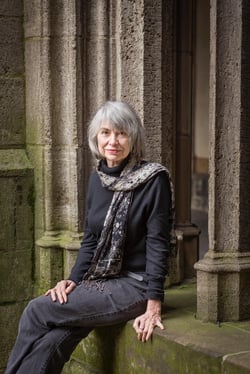Note April 4, 2022: Due to a last-minute cancellation of the flight by the airline and complications in rescheduling, Dr. Keller will not be able to be on campus for this lecture. Dr. Keller will deliver her lecture live, but via video-conferencing. We will still host the event in the physical space, for those who still wish to join us at United's campus. Otherwise, you can choose to join us via Zoom.

Apocalypse After All? Climate, Politics and Faith in the Possible
Dr. Catherine Keller
George T. Cobb Professor of Constructive Theology in the Theological School and Graduate Division of Religion of Drew University
Monday, April 4, 7:30 PM CT
On Campus and via Zoom
As the fires, floods, and droughts of global warming spiral around a planetary pandemic and intensify political precarity, the ancient symbol of apocalypse finds ever new energy. It pulses--quite apart from fundamentalist deployments--across fully secular news sources (the “Insect Apocalypse,” “the California Wildfire Apocalypse,” etc.) What other single word delivers a comparable warning of coming collective catastrophe? It is crucial therefore that Christian publics correct the misreading of Apocalypse as “End of the World.” The word means not closure but disclosure, and attaches to an ancient vision of radical transformation. The ancient Apocalypse denounced the imperial power and global economics of Rome--a pattern not lacking in current manifestation--only to announce the coming of “New Jerusalem,” green with “leaves for the healing of the nations.” We will meditate upon the social and environmental resonances of the symbol in the present, as faith communities work to find spiritual meaning and a healthy future for themselves and for the whole troubled planet.
Please RSVP. Registration is free.
Please note: Persons on campus need to be fully vaccinated. While masks are not required, visitors should wear a mask in accordance with health risks and seminary policy available here.
Questions? Contact Ashley at ahovell@unitedseminary.edu
REGISTER:
The Picard Lectures on Environmental Theology and Ethics are supported by an endowment made possible through the generosity of United alum, the Rev. Frank Picard, and members of the Picard family. The purpose of the lectureship is to explore questions and issues concerning the state of the creation from theological and ethical perspectives. The lectureship seeks to raise questions such as the relation between our spiritual life and the state of the natural world, and the response of religious leadership to the decline of the planet. In establishing the endowment the Picard family especially wishes to remember the deep appreciation for God’s creation they shared with the late David and Roland Picard.
----------------------------------------------------------------------
Dr. CATHERINE KELLER
Dr. Catherine Keller practices theology as a relation between ancient hints of ultimacy and current matters of urgency. As the George T. Cobb Professor of Constructive Theology in the Theological School and Graduate Division of Religion of Drew University, she teaches courses in process, political, and ecological theology. Within and beyond Christian conversation, she has all along mobilized the transdisciplinary potential of feminist, philosophical, and pluralist intersections with religion.Her most recent books invite at once contemplative and social embodiments of our entangled difference: Facing Apocalypse: Climate, Democracy, and Other Last Chances (Forthcoming April 2021); Political Theology of the Earth: Our Planetary Emergency and the Struggle for a New Public (2018); Intercarnations: On the Possibility of Theology (2017); and Cloud of the Impossible: Negative Theology and Planetary Entanglement (2014). Keller’s other books include On the Mystery: Discerning Divinity in Process (2008); God and Power: Counter-Apocalyptic Journeys (2005); Face of the Deep: A Theology of Becoming (2003); Apocalypse Now and Then: A Feminist Guide to the End of the World (1996); and From a Broken Web: Separation, Sexism, and Self (1986).



